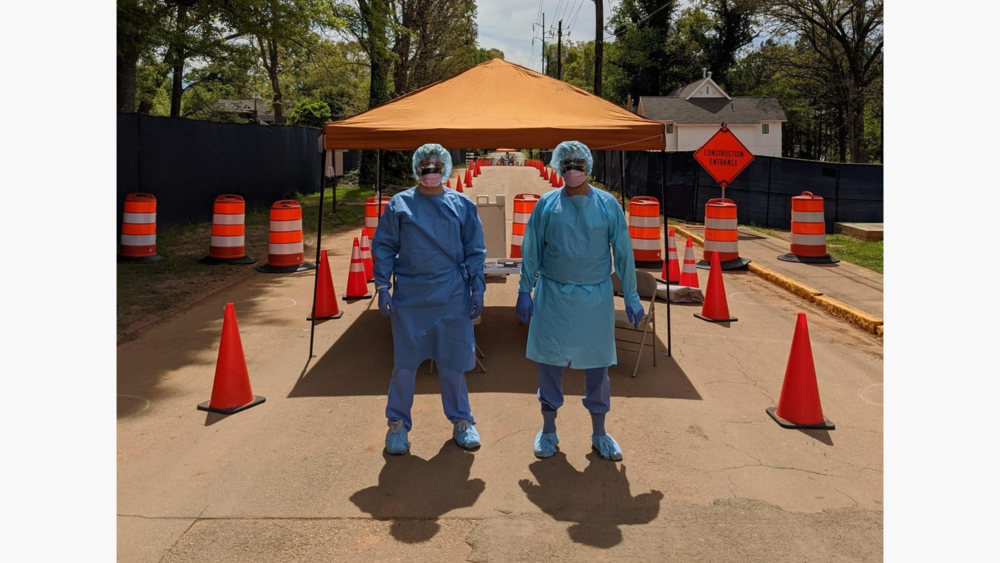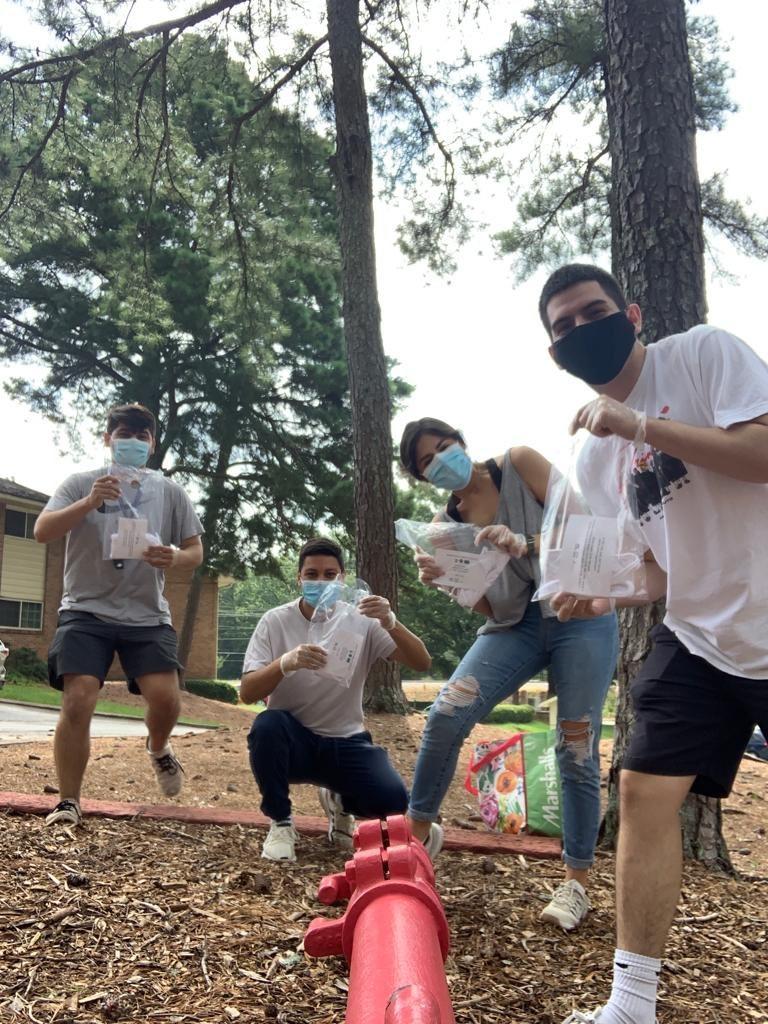
Caption
Dr. Heval Kelli volunteering at one of Ethne Health's testing drive-thrus in Clarkston, Georgia.
Credit: Courtesy of Heval Kelli
|Updated: August 28, 2020 1:09 PM
"On Second Thought" host Virginia Prescott speaks with Dr. Heval Kelli.

Dr. Heval Kelli volunteering at one of Ethne Health's testing drive-thrus in Clarkston, Georgia.
Last weekend, Georgia hit a grim milestone with 5,000 deaths from COVID-19 and related illnesses, surpassing all other conditions aside from heart disease and cancer, according to data from the Centers for Disease Control and Prevention.
It’s been widely reported that infections and deaths are disproportionately higher among people of color, but studies published in the Journal of American Medical Association, or JAMA, reveal an even sharper contrast in low-income non-white communities, where residents died of the virus at more than nine times the rate of residents of largely white, more affluent areas.
On Second Thought sat down with Dr. Heval Kelli, a cardiologist focused on prevention and health advocacy for underserved and refugee communities in the Atlanta metropolitan area.
"I grew up in one of the poorest communities in Atlanta, and I remember I was afraid to get sick," Kelli said, recalling that he would sometimes ignore symptoms of an illness out of fear of losing his job or a paycheck.
"I understand this challenge, and now I'm a physician on other side," he said. "I'm trying to figure out a way to help people focus on prevention. Maybe if we could prevent people from getting the infection, they're not going to be losing their job."

First generation pre-medical students from Georgia State University volunteering with the Clarkston Health Task Force.
INTERVIEW HIGHLIGHTS
On the importance of holistic community care
Medicine goes beyond the exam room. We shouldn't be just treating patients in the clinic; we should go beyond and advocate for people.
I think the best thing that ever happened to me was actually going to Morehouse School of Medicine, you know, an M.D. When I graduated from there, I learned about the importance of social advocacy, that medicine goes beyond the exam room. We shouldn't be just treating patients in the clinic; we should go beyond and advocate for people. And during my training at Emory, they just honed down that perspective and helped me to expand.
One of the first things we did early in March — you know, when the cases were going up in the first wave — a lot of the underserved community, especially immigrants, refugees and poor Americans, they had no access to any kind of form of education. COVID-19 was just something they heard about in the news. So people don't know how it transmits.
So we were able to translate material in different languages, and simplified an English format that everyone can understand. And me and my wife, we just kept calling the community across Atlanta and outside of Atlanta through text messaging, you know, using social media to educate the community about COVID-19. Because we believed prevention was the first key to address the rise.
On how communities reacted to the virus at first
When they see us in the community speaking up, they actually were more receptive to listen and follow the guidelines.
When they [first] heard about a virus infection, they felt like it was a shameful thing to have. I'll never forget that when someone called me like, "Hey, can I discuss something with you? But, I haven't told anyone in my family that I might be positive for COVID-19." I'm like, "You can't do that. This is not something to be ashamed about. You've got to tell your community, and you've gotta tell people who visit you that you have COVID-19, and they can't come visit you." I think that was something that I noticed initially, with the fear of telling people that you have the virus.
And then two, you know, some cultures, they're very welcoming, very socially connected. How do you tell people not to come visit you to your house, tell them we can't have engagement parties, or a graduation party for our kids? So that's a very hard thing for a lot of immigrant communities to accept, the new changes of the virus infection. But one thing that we notice in immigrant refugee community, they actually value a lot the opinion of expertise of educated people. So when they see us in the community speaking up, they actually were more receptive to listen and follow the guidelines.
On how COVID-19 is revealing underlying health conditions, and how we will need to track the effects of the virus over time
COVID-19 is just unmasking the unhealthy status of people.
Kelli: What I learned from looking at the data is: I think COVID-19 is just unmasking the unhealthy status of people. I mean, if you're someone who considers yourself healthy, and you show up to the hospital with COVID-19 and you have worse complications, it might show that you actually have diabetes, or obesity, or some heart disease that you have not probably gotten diagnosed with. So I think COVID-19 is going to be an interesting disease process for the next century that we going to learn about.
Prescott: The next century?
Kelli: We just, we don't know that much about the disease. We're understanding the process. But right now, we're only like, what — the process started in December, in China. Now we're in August. So, we need to look at the outcome [over] like, the next five, 10, 20 years and see how COVID is affecting people.
And that's why I tell people: be patient. Don't think you're immune to this disease. I think simple things like wearing a mask, washing your hands and avoiding large gatherings might actually prevent you from having long-term complications in the future that we're not aware of yet.
On how to get involved and help the community
My advice to many people: don't feel helpless.
I think one of the things about what COVID-19 is doing to many is making people feel helpless in a part of defeating this virus. I'll give you an example: the city of Clarkston really did something great. While the government and the CDC were trying to figure out all the guidelines and bring some of the resources in, the city of Clarkston came together with nonprofits like Ethne, Grace Village and the churches, along with Georgia State ... and actually started building a task force. One, they did a lot of testing on the ground. Two, they provided a health education format.
And I mean, I tell you, over the last five weekends, some of our pre-med and pre-health students passed out over 8,000 masks and hand sanitizer to almost 10 apartments in Clarkston. This is a prime example that everyone could be engaged in [to be] part of decreasing the rate of the virus infection spread, and also some of the complications. So I think my advice to many people: Don't feel helpless. You could be part of this solution as an individual level, and also be part of these organizations that actually doing some great work on the ground.
Get in touch with us.
Twitter: @OSTTalk
Facebook: OnSecondThought
Email: OnSecondThought@gpb.org
Phone: 404-500-9457
Georgia Health Initiative is a non-partisan, private foundation advancing innovative ideas to help improve the health of Georgians. Learn more at georgiahealthinitiative.org